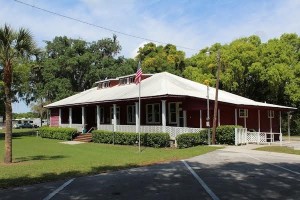Fruitland Park’s century-old Casino Community Center has been listed on the National Register of Historic Places.
Judy Hux Rainey, president of the Fruitland Park Historical Society, was notified by email from the National Park Service on Friday. Official letters of notification are being sent out this week, Rainey said, and Villages-News.com obtained a copy of the email notification.
City Manager Gary La Venia said he can’t comment on the Register listing until city commissioners have a chance to discuss it.
The Casino joins the Dyches House in Lady Lake, Holy Trinity Episcopal Church on Spring Lake Road, 28 Lake County properties and two in Sumter County listed on the National Register.
Chicago millionaire George C. Clark built the Casino in 1915 so the 800-odd residents of the village could have a place to party. Back then, “party” often as not meant an evening of storytelling, with songs and recitals by local residents—imagine Karaoke without the canned music and teleprompter.
The Casino is a rare public building designed in the vernacular Cracker architectural style—wood frame construction, metal roof, wide wrap-around porch, low eaves and a breezeway.
Cracker-style farm houses were endemic throughout the south from the 1870s to the 1950s. Public Cracker-style buildings are extremely rare, according to Ronald W. Haase, Adjunct Professor at the University of Florida School of Architecture and author of Classic Cracker: Florida’s Wood-Frame Architecture.
They’re rare because wood frame buildings don’t last long in Florida’s semi-tropical climate. Between termites and city commissions, most public buildings have rotted away or been torn down.
That’s what will probably happen in Fruitland Park, despite the National Register of Historic Places.
Commissioners want to tear down the building to make way for City Center, a 20-year old project that includes a new 12,000-square foot library and public park for concerts and festivals.
Demolition could come as soon as October, Community Development Director Charlie Rector told commissioners.
The city already has more than $1.2 million in grants to pay for the project, and lots of incentive—4,000 new residents are moving in this year just 1.5 miles away in the Villages of Fruitland Park, doubling the city’s population.

As residents of Lake County, Fruitland Park newcomers are more likely to make use of Fruitland Park’s new—and free—library than Sumter County facilities, where they will be considered non-residents.
Listing on the National Register listing represents a moral victory for the Historical Society in its battle with city commissioners to save the building.
After initially supporting the Register nomination, the city manager sent a Letter of Protest to the Keeper of the Register last month reversing the city’s stand, but the deadline for comments had passed.
Register status is honorary, however, and will not prevent commissioners from demolishing the building. It might make such demolition a national news story and it might have repercussions if and when three commissioners run for reelection.
The Society hired an Ocala attorney to press its claim that deeds from 1920 and 1949 conveying the building and property to the city stipulate that the building must be used as a community center for residents.
Commissioners hoped to find a benefactor to move the building to another location but have found no takers. Estimates to move the building and bring it up to code total more than $300,000.
Diagonally across the street from The Casino and the City Center project, Villages resident John Gibson plans to turn another building—the 100-year old Palm Eden Estate—into a classy upscale steak house.
That project has already received a preliminary okay from commissioners and will likely get the final go-ahead next month.
Ironically, the man who build Palm Eden, wealthy publishing magnate William Dwight of Massachusetts, sold The Casino to Fruitland Park in hopes it would forever remain a community center.

